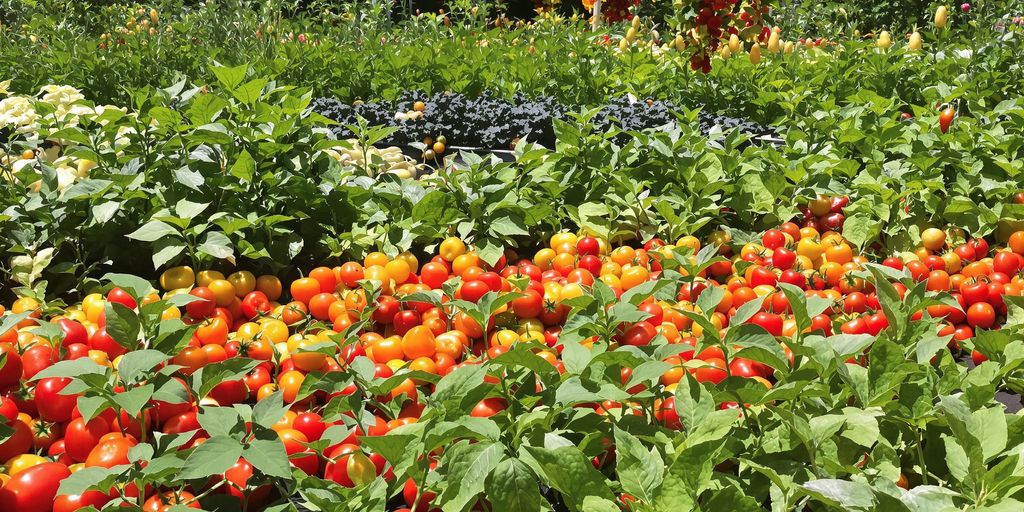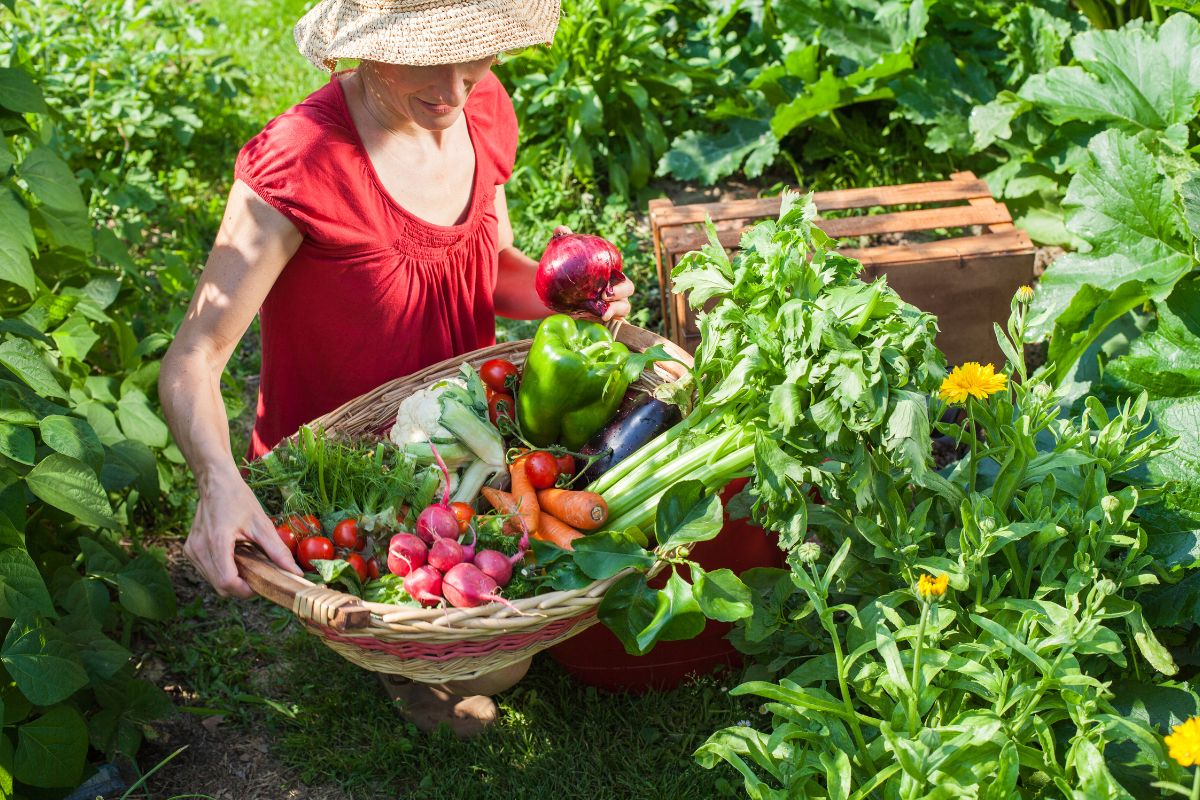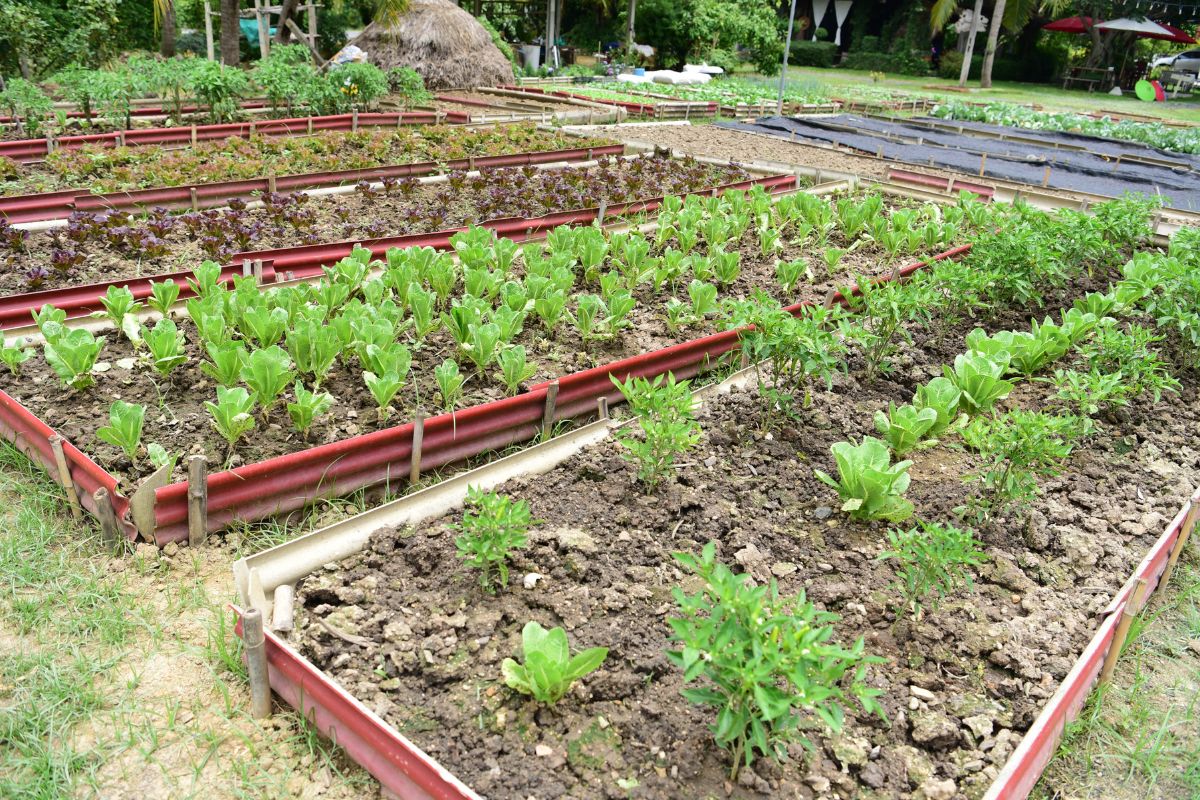
Growing your own veggies can be super rewarding, especially when it comes to warm season crops. If you’re in Rockford, you’re in luck—this area is great for growing all kinds of summer favorites. From juicy tomatoes to crunchy peppers, there’s a lot you can grow with just a little effort. But, like anything, it helps to know the basics before you dive in. This guide will walk you through everything you need to know about planting, caring for, and harvesting warm season veggie crops in Rockford.
Key Takeaways
- Warm season veggies thrive in Rockford’s summer weather, making it a great place to grow them.
- Tomatoes, peppers, squash, and beans are some of the best crops to try in this area.
- Prepping your soil and picking a sunny spot are key steps to a successful garden.
- Watering and fertilizing correctly will help your plants grow healthy and strong.
- Harvesting at the right time ensures the best flavor and freshness for your veggies.
Understanding Warm Season Veggie Crops in Rockford
What Makes a Crop a Warm Season Veggie
Warm season vegetables are those that thrive when temperatures are consistently warm, typically above 70°F during the day. These crops grow best in late spring through summer because they need both warm soil and air to flourish. Tomatoes, peppers, and squash are classic examples of warm season veggies, as they struggle in cooler conditions. Their seeds often won’t germinate in cold soil, and frost can kill them outright. If you’re planning your garden, keep in mind that these crops demand patience—they’re not fans of early planting.
Why Rockford’s Climate is Ideal for Warm Season Crops
Rockford’s climate offers the perfect conditions for warm season vegetables. With its hot summers and moderate humidity, the area provides just the right balance for these crops to thrive. The growing season typically stretches from late May to early September, giving plants ample time to mature. One major perk of Rockford’s climate is the long daylight hours in summer, which help boost growth and yield. Just be mindful of occasional dry spells; consistent watering will keep your plants happy.
Common Challenges for Warm Season Crops in Rockford
While Rockford is a great place for warm-season veggies, it’s not without its challenges. Pests like aphids and tomato hornworms can wreak havoc on your plants if left unchecked. Unpredictable weather—such as sudden storms or heatwaves—can also put stress on your crops. Additionally, soil quality can be a hurdle, as some areas may require extra compost or fertilizers to support healthy growth. Keeping your garden in top shape starts with proper maintenance, and that’s where our Yard Clean Up Services come in. By staying proactive with pest control, soil amendments, and regular yard maintenance, you can create the perfect environment for a thriving summer harvest.
Growing warm season veggies in Rockford can be rewarding, but it takes a bit of planning and care to overcome the unique challenges of the region.
For those anticipating the arrival of warm season crops like sweet corn, local vegetable growers are already gearing up for the seasonal cycle. It’s all part of the rhythm of gardening in this area.
Top Warm Season Veggie Crops to Grow in Rockford
Tomatoes: A Rockford Favorite
Tomatoes are hands-down one of the most rewarding crops to grow in Rockford. They thrive in the warm, sunny conditions that the area offers during the growing season. Whether you prefer cherry tomatoes for snacking or beefsteak varieties for sandwiches, there’s a tomato for everyone. Make sure to stake or cage your plants early to support the heavy fruit.
Peppers: Sweet and Spicy Varieties
From bell peppers to jalapeños, peppers are another fantastic choice for Rockford gardens. These plants love heat and can produce an impressive yield with proper care. Tip: Start your seeds indoors to give them a head start before transplanting them outside once the soil warms up.
Squash and Zucchini: High-Yield Options
If you’re looking for an easy, high-yield option, squash and zucchini are your go-to veggies. These plants grow quickly and can take over your garden if you’re not careful. Harvest them when they’re small for the best flavor and texture, and keep an eye out for squash bugs.
Beans: Pole vs. Bush Varieties
Beans are a versatile crop that comes in two main types: pole and bush. Pole beans grow vertically and save space, while bush beans are compact and easier to harvest. Choose based on your garden size and needs, but either way, beans are a reliable producer in Rockford’s climate.
A Healthy Garden Starts with the Right Care! Ensure your yard is ready for summer crops with our professional lawn and garden services. Call us today to schedule your consultation!
Preparing Your Garden for Warm Season Veggie Crops
Soil Preparation Tips for Rockford Gardens
Starting with the right soil is half the battle. Rockford’s soil can vary, so it’s important to test it before planting. You’ll want soil that’s rich in organic matter and drains well. If the test shows deficiencies, consider adding compost or aged manure to improve fertility. A balanced soil pH, ideally between 6.0 and 7.0, is key for most warm season crops.
Here’s a simple checklist to get your soil garden-ready:
- Remove rocks, weeds, and debris.
- Till or turn the soil to about 12 inches deep.
- Mix in compost or other organic material.
- Test the soil’s pH and nutrient levels.
For those using high tunnels, maintaining the right soil moisture and nutrient levels becomes even more critical. These structures can amplify growing conditions, but they also demand more attention to soil management.
Choosing the Right Location for Sunlight
Warm season veggies thrive in sunlight, so picking the right spot is crucial. Look for areas in your yard that get at least six to eight hours of direct sunlight daily. Avoid planting near tall trees or buildings that might cast shade. If space is limited, consider using raised beds or containers, which can be easily moved to sunnier spots.
Pro tip: Observe your garden throughout the day to see how the sunlight shifts. This can help you plan your planting zones more effectively.
Best Times to Plant Warm Season Veggies
Timing is everything when it comes to planting. In Rockford, the last frost date typically falls in late April or early May, making this the ideal window to start planting warm season crops. However, always check the weather forecast to avoid unexpected frost.
Here’s a quick planting guide for common warm season veggies:
| Crop | Seed Starting Indoors | Direct Planting Outdoors |
| Tomatoes | 6-8 weeks before frost | After last frost |
| Peppers | 8-10 weeks before frost | After last frost |
| Squash | Not needed | After soil warms |
| Beans | Not needed | After soil warms |
No matter what you’re planting, patience pays off. Rushing to get seeds in the ground before conditions are right can lead to poor germination and stunted growth.
Caring for Warm Season Veggie Crops in Rockford
Watering Strategies for Warm Weather
Keeping your warm season veggies hydrated is a balancing act. Too little water, and they’ll wilt; too much, and you risk root rot. The key is consistency. Aim to water deeply but less frequently—around 1-2 inches per week, depending on rainfall. Early morning is the best time to water, as it reduces evaporation and helps prevent diseases. For tomatoes and peppers, try to keep the leaves dry to avoid fungal issues. Drip irrigation or soaker hoses can make this easier.
Fertilizing for Maximum Yield
Warm season crops are hungry plants. They need a steady supply of nutrients to produce those juicy tomatoes or crunchy beans. Start with a balanced fertilizer when planting, then switch to one with more potassium and phosphorus once flowers appear. For example:
| Crop | Early Growth Fertilizer | Flowering/Production Fertilizer |
| Tomatoes | 10-10-10 | 5-10-10 |
| Peppers | 10-10-10 | 5-10-10 |
| Zucchini | 10-10-10 | 5-15-15 |
Don’t overdo it, though—too much nitrogen can lead to lush leaves but fewer veggies.
Pest and Disease Management in Rockford
Pests like aphids, hornworms, and squash bugs can wreak havoc on your garden. Regularly inspect your plants for signs of trouble, such as chewed leaves or discoloration. Hand-picking pests is effective for larger bugs like hornworms. For smaller pests, an insecticidal soap might be your best bet. To prevent diseases, rotate your crops each year and avoid planting the same family of plants in the same spot. Mulching can also help by reducing soil splash, which spreads disease.
Healthy plants are less likely to succumb to pests and diseases, so focus on proper watering, fertilizing, and spacing to keep them thriving.
If you’re growing native plants nearby, like the Gray-headed coneflower in natural areas, they can attract beneficial insects to help control pests naturally. It’s a win-win for your garden and the environment!
Harvesting and Storing Warm Season Veggie Crops
When to Harvest for Peak Flavor
Knowing when to pick your veggies is key to getting the best taste. For example, tomatoes should be harvested when they’re fully red but still firm. Peppers can be picked green or left to ripen to their full color. Squash and zucchini are best when they’re small to medium-sized—waiting too long can make them tough. Beans, like green beans, should be harvested when they’re slender and snap easily. Timing is everything to enjoy the freshest flavors.
Proper Techniques for Picking Veggies
Using the right methods to pick your crops helps avoid damage to the plant. For tomatoes and peppers, gently twist the fruit until it releases from the stem. With squash and zucchini, use a sharp knife or pruning shears to cut them cleanly from the vine. Beans can be plucked by hand, but make sure not to tug too hard as it might harm the plant. Remember, a little care now means more veggies later!
Storage Tips to Extend Freshness
Once harvested, proper storage keeps your veggies fresh longer. Tomatoes should be stored at room temperature, away from direct sunlight. Peppers can last longer in the fridge, ideally in a breathable bag. For squash and zucchini, refrigeration is best, but don’t wash them until you’re ready to use them. Green beans should be kept in a perforated bag in the fridge to maintain their crispness. For warm-season veggies like these, moisture control is essential to prevent spoilage.
Harvesting your garden’s bounty at the right time and storing it properly isn’t just about convenience—it’s about savoring the rewards of all your hard work.
Companion Planting for Warm Season Veggie Crops
Best Companion Plants for Tomatoes and Peppers
Companion planting is all about pairing crops that benefit each other. For tomatoes and peppers, consider planting basil nearby. Basil not only enhances the flavor of tomatoes but can also repel pests like aphids and whiteflies. Marigolds are another great choice—they help deter nematodes and other soil pests that might harm your veggies. You might also try planting onions or garlic around your peppers; their strong scent can confuse pests looking for a snack.
How to Deter Pests with Companion Planting
Using the right companions can naturally keep pests at bay. Here’s a quick list of pest-deterring plants:
- Nasturtiums: These flowers attract aphids, keeping them away from your crops.
- Chives: Their strong scent can deter carrot flies and aphids.
- Mint: While invasive, mint can help repel ants and flea beetles when planted in pots near your garden.
If you’re dealing with specific pests, research their natural predators or deterrents. For example, planting dill can attract ladybugs, which feast on aphids.
Improving Soil Health Through Companion Choices
Some plants do more than just grow—they actively improve the soil. Legumes like beans and peas fix nitrogen into the soil, which is essential for leafy crops like spinach or lettuce. Meanwhile, deep-rooted plants like radishes can break up compacted soil, making it easier for other plants to thrive. Rotating these companions each season can keep your soil in top shape.
Companion planting isn’t just practical; it makes your garden more diverse and vibrant. Plus, it’s a natural way to promote healthier plants without relying on chemicals.
For more insights into gardening techniques, check out the event on companion planting and other methods.
Sustainable Practices for Warm Season Gardening in Rockford
Using Mulch to Retain Moisture
Mulch is a simple yet powerful tool for keeping your garden soil moist and cool during Rockford’s warm season. By spreading a 2-3 inch layer of organic mulch like straw, wood chips, or shredded leaves around your plants, you can significantly reduce water evaporation. This practice not only conserves water but also helps suppress weeds, saving you time and effort. Plus, as the mulch breaks down, it enriches your soil with nutrients. Just be sure to keep the mulch a few inches away from the plant stems to avoid rot.
Composting for Nutrient-Rich Soil
Composting is like giving your garden a natural buffet of nutrients. Start by collecting kitchen scraps, like vegetable peels and coffee grounds, along with yard waste such as grass clippings and dry leaves. Layer them in a compost bin or pile, turning it every few weeks to speed up decomposition. Once it breaks down into dark, crumbly compost, mix it into your garden beds. The resulting soil will retain moisture better and provide essential nutrients for your warm season crops. It’s a win-win for both your plants and the environment.
Water Conservation Tips for Rockford Gardeners
Water is precious, especially during the hot months. To make the most of every drop, water your garden early in the morning or late in the afternoon to minimize evaporation. Drip irrigation systems or soaker hoses are excellent options for delivering water directly to the roots where it’s needed most. Another tip? Collect rainwater in barrels to use during dry spells. It’s an easy way to save on your water bill while keeping your garden thriving.
Gardening sustainably doesn’t have to be complicated. Small changes, like using mulch or composting, can make a big difference for your garden and the planet.
Get Your Garden Summer-Ready! If you’re planning to grow warm-season crops, make sure your yard is in top shape. Call us today for expert lawn and garden services!
Wrapping It Up
So, there you have it. Growing warm-season veggies in Rockford isn’t as tricky as it might seem. With a little planning, some patience, and a good dose of trial and error, you can enjoy a garden full of fresh produce. Remember, every season is a chance to learn something new. Whether it’s tomatoes, peppers, or squash, the effort you put in now will pay off when you’re enjoying those homegrown flavors. So grab your gloves, get your hands dirty, and make the most of the growing season. Happy gardening!
Frequently Asked Questions
What are warm season veggies?
Warm season veggies are plants that grow best in hot weather. They need warm soil and plenty of sunlight to thrive.
Why is Rockford good for growing warm season crops?
Rockford’s summers are warm and sunny, which is perfect for growing crops like tomatoes, peppers, and squash.
When should I plant warm season veggies in Rockford?
You should wait until the last frost has passed, usually in late spring, before planting warm season veggies.
How do I keep pests away from my garden?
You can use companion plants, natural sprays, or barriers like nets to protect your garden from pests.
What’s the best way to water warm season crops?
Water deeply but less often, aiming for the roots. Early morning is the best time to water to avoid evaporation.
How do I store veggies after harvesting?
Keep them in a cool, dry place or in the fridge. Some veggies, like tomatoes, last longer if kept at room temperature.
Prepare Your Yard for a Thriving Summer Garden! From soil prep to irrigation, we’ve got the services you need for a bountiful harvest. Contact us now to get started!



